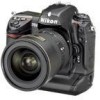Nikon D2H D2H User's Manual - Page 96
Exposure, Metering
 |
UPC - 018208252084
View all Nikon D2H manuals
Add to My Manuals
Save this manual to your list of manuals |
Page 96 highlights
Exposure Controlling How the Camera Sets Exposure Taking Photographs-Exposure Metering Three metering method are available to determine how the camera sets exposure. Before shooting, press the metering selector lock button and rotate the metering selector to choose a method suited to the composition and lighting conditions, and confirm your selection in the viewfinder. Method Description Metering is performed by 1,005-pixel RGB sensor, which sets exposure based on variety of information from all areas of frame. This system demonstrates its effectiveness most dramatically where bright (white or yellow) or dark (black or dark green) colors occupy large area of frame, when its results approach what is seen by human eyes. 3D color matrix metering, 3D color which uses range information from lens in adjusting exposure, is available matrix/ only with type G or D lenses. Color matrix metering, which does not inColor clude range information, is available with other CPU lenses or when focal matrix length and maximum aperture of non-CPU lens are specified using NonCPU lens data item in shooting menu ( 124; center-weighted metering is used if focal length or aperture is not specified). Matrix metering will not produce desired results with autoexposure lock ( 95) or exposure compensation ( 97), but is recommended in most other situations. Camera meters entire frame but assigns greatest weight to area in center of frame 8 mm (0.31˝) in diameter, shown by corresponding 8-mm referCenter- ence circle in viewfinder. Classic meter for portraits; recommended when weighted using filters with an exposure factor (filter factor) over 1 × ( 233).* Camera meters circle 3 mm (0.12˝) in diameter (approximately 2% of frame). Circle is centered on current focus area (in group dynamic AF, on center focus area of current group; 76), making it possible to meter off-center subjects (if non-CPU lens is used or if dynamic-area AF with Spot closest subject priority is in effect, camera will meter center focus area). Ensures that subject will be correctly exposed, even when background is much brighter or darker.* * For improved precision with non-CPU lenses, specify lens focal length and maximum aperture in Non-CPU lens data menu ( 124). b6-Center Weight ( 185) This option controls the size of the area assigned the greatest weight in centerweighted metering. 84















